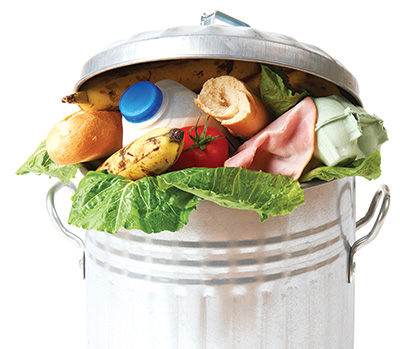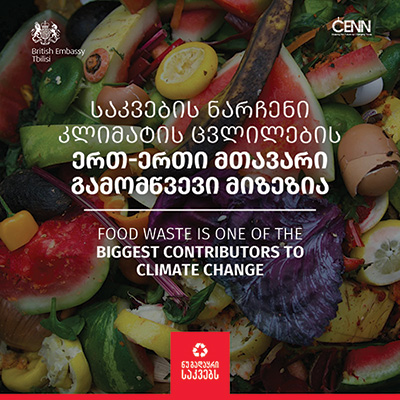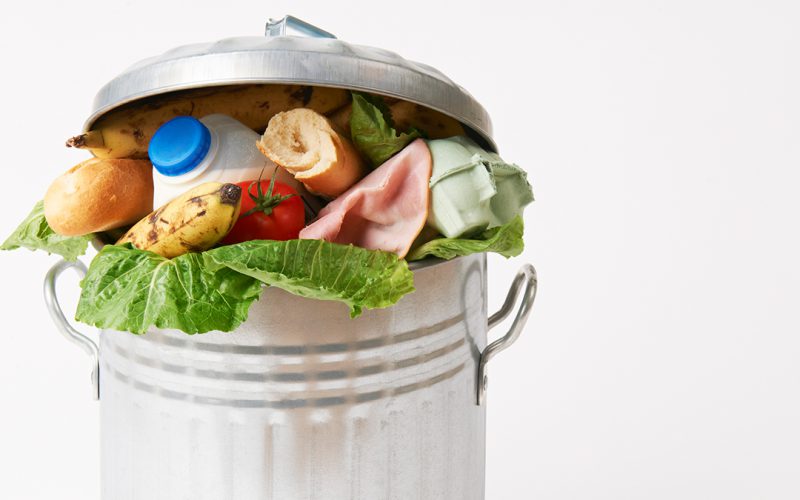What Georgia stands to gain from ending food waste
Environmental NGO CENN writes how ending food waste in Georgia can also end hunger, lessen environmental pollution and lift burdens on both the budget and the economy
 A third of the food produced across the world never reaches the consumer and goes to waste. And even when it does make the perilous journey to our kitchen, a large portion of it still ends up in the bin.
A third of the food produced across the world never reaches the consumer and goes to waste. And even when it does make the perilous journey to our kitchen, a large portion of it still ends up in the bin.
The most comprehensive assessment of food waste to date, the UNEP Food Waste Index, shows that worldwide, people waste almost a billion tonnes of food a year, and 61% of food waste is produced at the household level.
Wasting food has enormous consequences socially, environmentally, and economically.
The biggest issue that has exposed cracks in the way our food systems are designed is that it’s not only the left-over scraps that end up in landfills: perfectly edible food ends up in landfills when it could be used to feed those who need it the most.
This has become particularly apparent in Georgia during the pandemic, when many have lost their jobs, are going hungry or cannot afford a healthy diet.
Another reason to be raising the alarm: food waste causes about 10% of the greenhouse gas (GHG) emissions that are driving the climate change emergency. Food waste that decomposes in landfills releases carbon dioxide and methane. Methane is a GHG that is at least 28 times more potent than carbon dioxide, accounting for more greenhouse gas emissions globally than all of the commercial flights we take each year. When food is lost or wasted, so are the vast amounts of resources that have gone into producing it.
The UNEP report mentioned above writes that 931 million tonnes of food waste was generated in 2019, 61% of which came from households, 26% from food service, and 13% from the retail sector.
The reasons behind food waste can range from anything from products being too close to the expiration date, to incorrect labeling, (even slightly) damaged packaging, deterioration of the quality of fresh products, over-supply, large portion sizes, or poor phytochemical and storage practices.
Food waste in Georgia
Although there is no data available to measure food waste levels in Georgia, we know from waste composition reports produced by CENN that over 40% of the waste in the country’s landfills is organic waste, large portions of which consist of food products.
Food waste has a substantial impact on the economy and accounts for a huge loss of revenues for all actors in the food supply chain, including the government and the consumer.
Unlike many other countries, Georgia does not have food banks, nor does it have a legal framework to incentivize food donations for recovery and redistribution of food to vulnerable groups.
This is most evident in the case of business taxes: businesses still have to pay profit tax (15%) and VAT (18%) on donated products. There is an exemption of corporate profit tax if donating to charitable organizations, which is valid only if the total deductible amount does not exceed 10% of the net profit made by the organization during the preceding calendar year.
For this reason, quite a high amount of food waste is being generated, particularly at the retail level, instead of it being redistributed to those who need it the most. Many supermarkets in Georgia tend to remove products from shelves one to two weeks prior to the expiry date to avoid potential problems of liability or accusations of poor quality. Some supermarket chains in Georgia throw out between 300 and 500 kg of products every few days per branch.
This level of inefficiency in our food systems puts a significant strain on the country’s economy.
Last month, the Caucasus Environmental NGO Network (CENN), with the support of the British Embassy, kicked off a new project called “Sustainable Food Systems for Climate Resilience.”
The project aims to contribute to a reduction of the country’s GHG emissions by initiating a dialogue between the private and public sectors and advocating relevant policy changes at the governmental level. For this reason, CENN has put together a Food Waste Working Group composed of key actors in the food industry affected by this issue and will be advocating policy changes.
Consumer awareness
A lot can be said about consumer habits and awareness as consumer behavior is one of the biggest drivers of food waste. Consumers are less likely to buy and consume fruits and vegetables due to their aesthetic or physical irregularities. As such, one third of the fruits and vegetables globally do not make it to our grocery store shelves because they are rejected to avoid complaints of bad quality by consumers.
 More than 820 million people go hungry every day, and climate change is increasingly harming agriculture. Saving ugly fruit and vegetables isn’t just a question of ethics, it is a question of resources.
More than 820 million people go hungry every day, and climate change is increasingly harming agriculture. Saving ugly fruit and vegetables isn’t just a question of ethics, it is a question of resources.
Lack of planning and overbuying is leading households to throw away food, which is money wasted. But what is also causing high amounts of food waste in households is the lack of knowledge, whether it’s knowing how to use leftovers from the table to come up with new meals, using scraps for composting, or more importantly, reading food labels correctly.
Food labeling
Products considered “high risk,” such as meat, usually include Use By dates on their packaging, which means the product should be consumed by that date. Low-risk products, such as grains, are usually labeled with a Best Before date, which means that the product can still be consumed after the indicated date. Food past its Best Before date may lose some qualities, such as a strong aroma, but it is still usually perfectly edible.
Reducing food waste will have economic, social and environmental benefits. It would cut greenhouse gas emissions, slow the destruction of nature through land conversion and pollution, enhance the availability of food and thus reduce hunger, and save money at a time of global recession.
CENN, with the support of the British Embassy, is running an awareness-raising campaign on food waste with the aim to influence consumers to abandon their wasteful habits. As part of the campaign, various influential restaurants and chefs are stepping forward to provide tips and advice on how people can reduce their food waste in their restaurants and households.
It is clear that we need to reconnect to our food and to remember its value and resources that go into its production and understand how we, as individuals, contribute to the problem of food waste.

